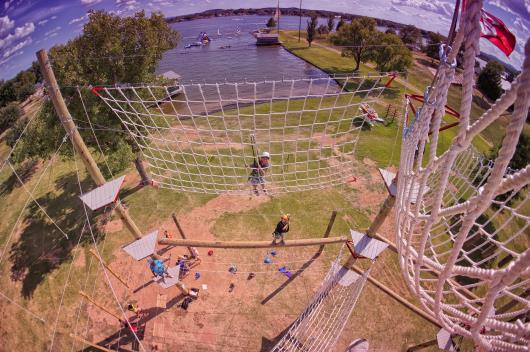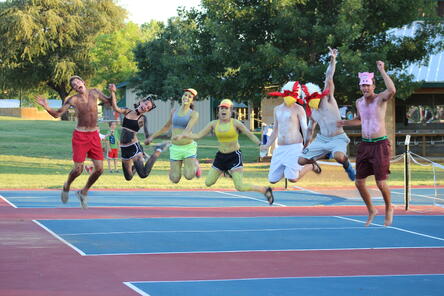How much should summer camp cost
The cost of a summer camp experience can vary substantially. Overnight camps can range from around $300 – almost $2,000 per week. Day camps can charge from $100-$1300 per week.
With variations this large and so many options to choose from, it leads to some obvious questions:
"How much should summer camp cost? Why is summer camp so expensive? Why are some summer camps so much more expensive than others?"
The premium camps are more expensive for two primary reasons:
- Facilities and activities
- Personnel
Facilities and Activities

The most obvious difference between premium summer camps and other camps is the quality of facilities and their number of activities. Some camps are simple and basic, offering a handful of activities with simple equipment. Premium camps offer a myriad of activities (often over 40) and an impressive physical plant with pools, ropes courses, slides, ski boats, horses, and specialized equipment all placed on a beautiful site.
Additional activities and impressive facilities are expensive. Some programs are especially costly to offer. Horseback, waterskiing, ropes courses and climbing walls all require substantial investments in equipment and instructors. Premium camps typically provide superior equipment, facilities and variety to their more affordable cousins.
Personnel
While physical differences are certainly the most obvious, the single most important difference between premium camps and less expensive camps is personnel. Premium camps generally have:- Better ratios of campers to counselors
- Better counselor training
- More full time staff
- Superior professional development
Each of these areas adds substantial value to the campers and their families, but they also increase the cost of the camp.
Camper to Counselor Ratios
Some camps hire the minimum number of counselors needed to provide the activities safely. While this makes activities possible, it rarely provides the counselor with enough time to connect with individual campers. Instead, he or she is in “crowd control” mode when dealing with multiple campers.

Premium camps hire far more counselors than are needed to staff activities because they know that camp is ultimately about relationships: relationships between campers and relationships between counselors and campers. Children will have role models and the critical question for parents is “who will be my child’s role models”? With this in mind, excellence in counselors and their relationships with their campers is critical to providing an excellent camp experience.
As a result, a premium overnight camp might have one counselor for every 3-4 campers while a more budget-friendly camp might hire one for every 8-10 campers. It is important when comparing camper to counselor ratios to make sure that the camp excludes kitchen and maintenance staff from their calculations. The relevant comparison is the number of individuals working directly with the children (and acting as role models to them).
Counselor Training
All camps provide basic safety training to their staffs. Typically, basic safety training can take as little as 2-3 days.
On the other extreme are camps that provide extensive orientation programs that last as long as two weeks. These camps will bring in outside experts on youth development, group dynamics and excellence in instruction. They will spend substantial amounts of time training their staff on dealing with homesickness, social cruelty, parent communication and dealing with challenging behaviors.
These camps provide opportunities to not only learn new skills, but also practice and hone them. A superior orientation increases motivation and skill in the counselors and sets the stage for excellence once the campers arrive.
Size of Full Time Team
Some budget camps have almost no full time staff. In some cases, the camp might be run by someone that is either part-time or has other non-camp responsibilities throughout the year.
Premium camps, by contrast, typically have teams of individuals who work year-round on the camp. Having a large full-time team improves the camp for several reasons.
- There is more time for important tasks, from safety procedures to special events to facility improvement.
- A full time team enables a camp to spend vastly more time recruiting, interviewing and selecting counselors.
- Concentrating year-round on camp provides greater expertise and allows individuals to go up the “experience curve”.
- Attending conferences and networking with other camp professionals to learn best practices.
Superior Professional Development
The American Camp Association and several other organizations host multiple camp conferences each year. Some of these conferences focus on narrow topics (for example, using technology at camp or dealing with adolescent behavioral struggles) while others provide a broad array of sessions. Some conferences will have over 150 educational sessions ranging from hiring practices to dietary needs to educational trends.
The best camps will send teams to multiple conferences each year. Doing so assures that the their teams can provide the best experiences for their campers using the most current information available. While summer camp might not initially seem like an area where new information is important, this conclusion is incorrect. In the past 20 years, brain research has exploded and driven new ideas on learning, behavior and youth development. Understanding these areas enable camp professionals to maximize their effectiveness with children.
Philosophical Challenge
Camp professionals often struggle with two important goals. On the one hand, they believe that every child (regardless of financial situation) should have the opportunity to attend summer camp. I often say that the worst camp is better than the best mall or video game.
On the other hand, they strive to create the best possible experience possible for the campers in their care. This desire for excellence leads to improving all the physical and personnel aspects of the camp. Doing so, however, drives up the costs of the camp, especially as all of the camp’s costs must be covered during 7-10 weeks of the summer.
Some camps bridge this challenge through scholarship programs that provide reduced priced (or even free) camp sessions to families with lower financial capability. Doing so enables to camp to avoid compromising its desire for excellence while also serving a broad spectrum of families.



